Garden Maintenance in Norwood
Maintaining a beautiful garden in Norwood requires a combination of knowledge, dedication, and the right techniques. Whether you're a seasoned gardener or just starting out, understanding the specific needs of your garden can make all the difference. In this comprehensive guide, we'll explore essential garden maintenance tips tailored for Norwood's unique climate and soil conditions.
Norwood's climate offers a fertile environment for a variety of plants, but it also presents its own set of challenges. From seasonal changes to local pests, being prepared can help ensure your garden thrives year-round. Let's delve into the key aspects of garden maintenance that will keep your outdoor space vibrant and healthy.
Effective garden maintenance starts with proper planning and regular care. By following a structured approach, you can prevent common issues and enjoy a lush, green garden. Below, we outline the fundamental steps to maintain your garden in Norwood.
Understanding Norwood's Climate
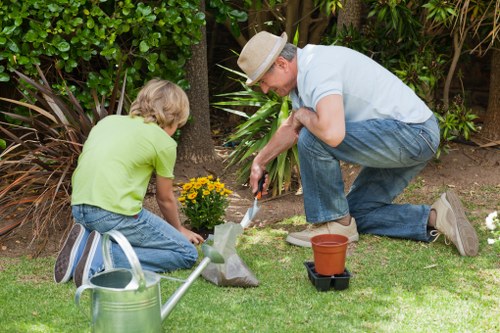
Seasonal Changes
Norwood experiences distinct seasons, each bringing its own set of gardening tasks. Understanding these seasonal shifts is crucial for timing your maintenance activities effectively.
In spring, focus on planting new flowers and vegetables, as the soil warms and days become longer. Summer requires diligent watering and pest control to keep plants healthy. Autumn is ideal for pruning and preparing for the colder months, while winter involves protecting sensitive plants from frost.
By aligning your garden maintenance schedule with the seasons, you can optimize plant growth and minimize potential problems.
Soil Preparation and Health
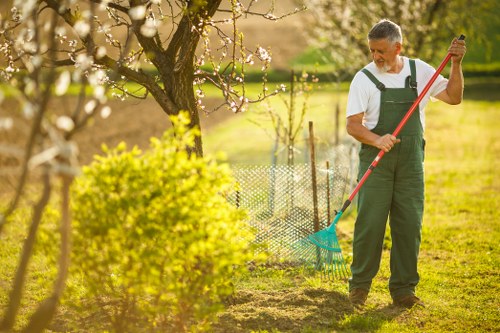
Testing and Amending Soil
The foundation of a thriving garden is healthy soil. Conducting regular soil tests helps determine its pH level and nutrient content, allowing you to make necessary amendments.
In Norwood, the soil may require the addition of organic matter such as compost or manure to improve fertility and drainage. Adjusting the pH with lime or sulfur can create an optimal environment for your plants.
Maintaining soil health through proper fertilization and aeration ensures that your plants receive the nutrients they need to flourish.
Plant Selection and Care
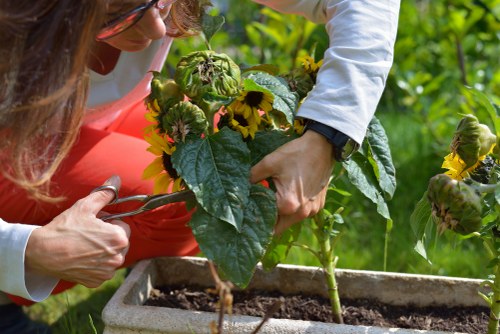
Choosing the Right Plants
Selecting plants that are well-suited to Norwood's climate is essential for a successful garden. Consider factors such as sunlight exposure, soil type, and water availability when choosing your plants.
Native plants are often a great choice as they are adapted to the local environment and can thrive with minimal maintenance. Additionally, incorporating a variety of plants can enhance biodiversity and create a more resilient garden ecosystem.
Proper plant selection not only ensures beauty but also reduces the need for excessive watering and pest control.
Irrigation and Water Management
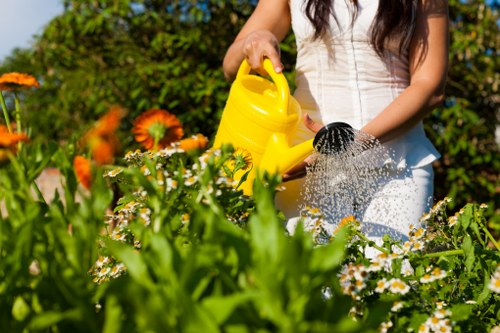
Efficient Watering Techniques
Water is a vital resource for any garden, and managing it efficiently can save time and reduce costs. Implementing drip irrigation systems ensures that water is delivered directly to the plant roots, minimizing evaporation and runoff.
Mulching around plants helps retain moisture in the soil, reducing the frequency of watering needed. Additionally, collecting rainwater in barrels can provide an eco-friendly water source for your garden.
By adopting sustainable watering practices, you can maintain a healthy garden while conserving water.
Pest and Disease Management
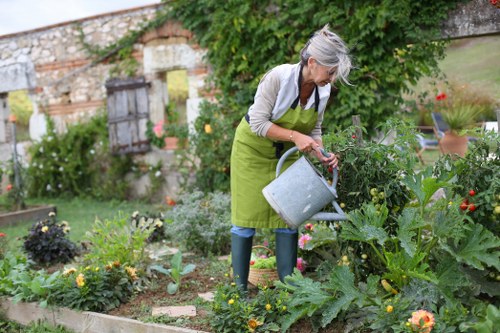
Preventative Measures
Protecting your garden from pests and diseases is crucial for plant health. Regularly inspecting plants for signs of trouble allows for early intervention and minimizes damage.
Implementing natural pest control methods, such as introducing beneficial insects or using organic pesticides, can effectively manage unwanted pests without harming the environment.
Maintaining good garden hygiene by removing dead plants and debris reduces the risk of disease spread, ensuring a robust and disease-resistant garden.
Pruning and Trimming
Maintaining Plant Structure
Regular pruning and trimming help maintain the shape and health of your plants. Removing dead or diseased branches promotes better air circulation and encourages new growth.
Proper pruning techniques vary depending on the type of plant, so it's essential to understand the specific needs of each species in your garden.
Well-maintained plants not only look appealing but also contribute to the overall vitality of your garden.
Lawn Care
Achieving a Green, Healthy Lawn
A lush lawn is a cornerstone of garden beauty. Regular mowing, edging, and fertilizing keep your grass looking its best.
Overseeding in the fall can help fill in bare spots and improve lawn density, while aerating the soil enhances root growth and nutrient uptake.
Proper lawn care techniques ensure a resilient and attractive green space that enhances the overall appeal of your garden.
Garden Tools and Equipment
Essential Tools for Maintenance
Having the right tools makes garden maintenance more efficient and enjoyable. Invest in quality equipment such as pruners, hoes, rakes, and watering systems to tackle various tasks with ease.
Regularly maintaining your tools by cleaning and sharpening ensures their longevity and effectiveness, making your gardening efforts more productive.
Equipping yourself with the proper tools is a key component of successful garden maintenance in Norwood.
Seasonal Maintenance Tips
Adapting to Seasonal Changes
Each season brings unique challenges and opportunities for your garden. Adapting your maintenance routine to these changes ensures continuous growth and beauty.
In spring, focus on planting and preparing beds, while summer requires vigilant watering and pest control. Autumn is the time for pruning and composting, and winter involves protecting sensitive plants from frost and snow.
By tailoring your maintenance activities to the season, you can keep your garden in optimal condition throughout the year.
Native Plants and Sustainability
Embracing Local Flora
Incorporating native plants into your garden promotes sustainability and supports local ecosystems. Native species are well-adapted to Norwood's climate and require less water and maintenance.
They also provide habitat and food for local wildlife, contributing to a balanced and thriving garden environment.
Choosing native plants is a sustainable gardening practice that enhances the beauty and ecological health of your garden.
Mulching and Composting
Enhancing Soil Quality
Mulching helps retain soil moisture, suppress weeds, and regulate soil temperature. Organic mulches, such as wood chips or straw, also decompose over time, enriching the soil with nutrients.
Composting kitchen scraps and garden waste creates a valuable source of organic matter that can be incorporated into your soil to improve its structure and fertility.
Both mulching and composting are essential practices for maintaining healthy soil and a productive garden.
Creating a Maintenance Schedule
Staying Organized
Establishing a garden maintenance schedule helps ensure that all necessary tasks are completed in a timely manner. Break down tasks by season and assign specific dates to stay on track.
Using digital calendars or gardening apps can assist in keeping track of watering schedules, fertilizing, and other regular maintenance activities.
A well-organized schedule promotes consistency and prevents neglect, leading to a healthier and more beautiful garden.
Dealing with Weeds
Effective Weed Control
Weeds can quickly take over a garden, competing with desirable plants for nutrients and water. Regular weeding is essential to keep your garden tidy and healthy.
Applying mulch can suppress weed growth, while manual removal ensures that unwanted plants are extracted completely. For larger infestations, consider using eco-friendly herbicides as a last resort.
Maintaining a weed-free garden minimizes competition and allows your plants to thrive.
Pruning Techniques
Enhancing Plant Health
Proper pruning techniques are vital for the health and aesthetics of your plants. Removing dead or overcrowded branches improves air circulation and light penetration, reducing the risk of diseases.
Different plants require different pruning methods, so it's important to research the specific needs of each species in your garden.
Regular pruning stimulates new growth and maintains the desired shape and size of your plants.
Fertilization Practices
Boosting Plant Nutrition
Fertilizing your garden provides essential nutrients that support plant growth and development. Choose the right type of fertilizer based on your soil's needs and the specific requirements of your plants.
Organic fertilizers, such as compost or bone meal, enrich the soil naturally, while synthetic fertilizers offer targeted nutrient supplementation.
Proper fertilization ensures that your plants receive the necessary sustenance to flourish throughout the growing season.
Protecting Against Frost
Winter Garden Care
Winter can bring harsh conditions that threaten the health of your garden. Protecting vulnerable plants from frost involves using covers, mulches, and selecting frost-resistant species.
Installing frost blankets or using cloches provides a barrier against freezing temperatures, while mulching helps insulate the soil.
Taking these precautions ensures that your garden survives the winter and is ready to thrive come spring.
Integrating Hardscaping elements
Enhancing Garden Structure
Incorporating hardscaping elements such as pathways, patios, and garden beds adds structure and functionality to your garden. These features not only improve aesthetics but also facilitate easier maintenance.
Choosing materials that complement your garden's design and are suitable for Norwood's climate ensures durability and longevity.
Well-planned hardscaping enhances both the beauty and practicality of your garden space.
Seasonal Planting Guide
Optimizing Planting Times
Knowing the best times to plant various species is key to a successful garden. In Norwood, spring and fall are ideal for planting a wide range of flowers, vegetables, and shrubs.
Spring planting takes advantage of the warming temperatures and longer days, while fall planting allows plants to establish roots before winter sets in.
Refer to local planting guides to determine the optimal planting windows for your specific plants.
Maintaining Garden Tools
Ensuring Longevity and Efficiency
Proper maintenance of your garden tools extends their lifespan and ensures they function effectively. Clean tools after each use to prevent rust and deterioration.
Sharpening blades and oiling moving parts keeps tools in top condition, making gardening tasks easier and more efficient.
Investing time in tool care pays off by providing reliable equipment for all your garden maintenance needs.
Composting for a Sustainable Garden
Creating Organic Fertilizer
Composting transforms kitchen scraps and garden waste into valuable organic fertilizer, enriching your soil naturally. Setting up a compost bin in your garden is an eco-friendly way to recycle waste.
Maintaining the right balance of green and brown materials, along with regular turning, ensures efficient composting and high-quality output.
Using compost in your garden reduces the need for chemical fertilizers and promotes sustainable gardening practices.
Attracting Beneficial Wildlife
Enhancing Garden Biodiversity
Encouraging beneficial wildlife, such as bees, butterflies, and birds, supports pollination and natural pest control. Planting a variety of flowers and providing habitats like birdhouses and bee hotels can attract these helpful creatures.
A diverse garden ecosystem promotes resilience and reduces reliance on chemical interventions.
Creating a wildlife-friendly garden enhances its beauty and contributes to environmental health.
Mulching Techniques
Benefits of Mulching
Mulching offers several advantages, including moisture retention, weed suppression, and soil temperature regulation. Applying a layer of mulch around plants helps create a stable environment for healthy growth.
Organic mulches, such as bark or compost, decompose over time, adding nutrients to the soil, while inorganic mulches like gravel or plastic provide long-lasting coverage.
Choosing the right type of mulch for your garden enhances both its functionality and appearance.
Pruning for Better Growth
Techniques for Various Plants
Different plants require specific pruning methods to promote optimal growth. For example, flowering shrubs benefit from being pruned after blooming to encourage more blooms the following season.
Fruit trees should be pruned to improve air circulation and sunlight exposure, which enhances fruit production and overall tree health.
Understanding the unique pruning needs of each plant ensures that your garden remains healthy and vibrant.
Weed Prevention Strategies
Keeping Your Garden Clean
Preventing weeds from taking over your garden involves proactive strategies such as using landscape fabric, applying mulch, and practicing crop rotation.
Regularly inspecting your garden for early weed growth allows for prompt removal before they can spread and compete with your plants.
Implementing these strategies maintains a clean and productive garden environment.
Seasonal Cleanup
Preparing for Seasonal Changes
As seasons change, performing thorough garden cleanups helps maintain plant health and prepares your garden for upcoming weather conditions. Removing dead leaves, spent flowers, and fallen branches prevents disease and pest infestations.
Preparing garden beds by adding compost or mulch in the fall ensures that your plants have the necessary nutrients to thrive in the spring.
Regular seasonal cleanups contribute to a well-maintained and beautiful garden throughout the year.
Integrated Pest Management
Sustainable Pest Control
Integrated Pest Management (IPM) combines biological, cultural, and mechanical practices to manage pests sustainably. Monitoring pest populations and identifying threats early allows for targeted interventions.
Introducing natural predators, such as ladybugs or praying mantises, helps control pest populations without harmful chemicals.
Adopting IPM practices ensures effective pest control while maintaining ecological balance in your garden.
Creating a Garden Layout
Designing for Function and Beauty
A well-thought-out garden layout enhances both functionality and aesthetics. Consider the placement of plants based on their sunlight needs, height, and color schemes to create a harmonious and visually appealing space.
Incorporating pathways, seating areas, and focal points adds interest and usability to your garden.
Thoughtful garden design facilitates easier maintenance and maximizes the beauty of your outdoor space.
Regular Monitoring and Inspection
Maintaining Plant Health
Consistently monitoring your garden allows you to detect issues such as pests, diseases, or nutrient deficiencies early on. Regular inspections enable timely interventions, preventing minor problems from becoming major setbacks.
Keeping a gardening journal to track observations and maintenance activities can help identify patterns and inform future care strategies.
Proactive monitoring ensures the ongoing health and vitality of your garden.
Final Thoughts on Garden Maintenance
Achieving a Thriving Garden
Maintaining a garden in Norwood involves a blend of strategic planning, regular care, and a deep understanding of your local environment. By implementing the tips and techniques outlined in this guide, you can cultivate a vibrant and resilient garden that brings joy and beauty to your outdoor space.
Remember, gardening is a continuous learning process. Stay informed, be patient, and enjoy the rewards of your dedicated efforts.
Contact us today to learn more about professional garden maintenance services in Norwood and take the first step towards your dream garden.